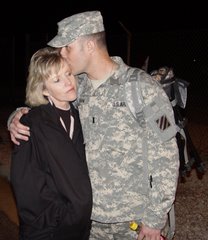Monday, March 17, 2008
Cheney Says US Support For Iraq 'Unwavering'
BAGHDAD (AFP) — US Vice President Dick Cheney declared Washington's "unwavering" support for Iraq during a surprise visit to Baghdad on Monday just days before the war enters its sixth year.
A series of bomb blasts greeted Cheney's high-security and secrecy-shrouded arrival, underscoring the deadly violence that still grips the nation five years after US bombs began dropping on Baghdad to topple Saddam Hussein.
Cheney, on a visit aimed at highlighting security gains and promoting political progress, said he had been sent by President George W. Bush to thank Iraqi leaders for their efforts in steering the country towards democracy.
He was in Baghdad, he added, to "reaffirm to the Iraqi people the unwavering commitment of the United States to support them in finishing the difficult work that lies ahead."
"It's especially significant I think to be able to return this week as we mark the fifth anniversary of the beginning of the campaign that liberated the people of Iraq from Saddam Hussein's tyranny and launched them on the difficult but historic road to democracy," Cheney said after meeting Prime Minister Nuri al-Maliki.
In a separate mission, US Republican presidential hopeful John McCain was meeting Iraqi leaders and US military officials to assess the success of the "surge" strategy that deployed more soldiers to Iraq, his aides said.
Maliki said visits by US officials were crucial to helping achieve success in Iraq and in the US-led "war on terror".
"These visits really cement and support the relationship between the two countries... the success that we achieve in Iraq against terrorism and in the war against terrorism which is a global war," Maliki said.
Cheney also held talks with the top US commander in Iraq, General David Petraeus, and US ambassador Ryan Crocker.
Soon after his arrival, three explosions rocked Baghdad, including a car bombing in the central neighbourhood of Karada that killed three people.
A security official said one of the other blasts was caused by a mortar attack on the highly-fortified Green Zone, home of the US embassy and the seat of Iraqi government, while a road bomb killed a policeman.
But in a bid to highlight the improved situation in Baghdad, Cheney criss-crossed outside the Green Zone to meet President Jalal Talabani, his two deputies and Shiite leader Abdel Aziz al-Hakim.
The vice president's 11-vehicle motorcade, at times escorted by up-armoured Humvees with machine gunners scanning the urban landscape and overseen by Apache helicopters, took him to meet Talabani and his deputies Adel Abdel Mahdi and Tareq al-Hashemi at his home.
He then went to Hakim's office and also to the residence of parliament speaker Mahmud Mashhadani.
After his meeting with Cheney, Hakim said his views were "identical" with the US leader which will "help guide work on the long-term strategic relationship" with Washington that is currently under discussion.
Cheney's visit is the first stop on a nine-day tour of the Middle East and beyond, with scheduled landings in Oman, Saudi Arabia, Israel and the West Bank, and Turkey.
A senior administration official told reporters accompanying Cheney that the vice president would tell the Iraqis "they need to continue to show some progress" on legislation seen as key to defusing sectarian strife.
The laws include an oil-revenue sharing measure; a law setting out provincial government powers; and one covering elections that the US official said were expected to take place on October 1.
The official, who asked not to be named, said negotiations to forge an agreement governing long-term US-Iraq ties would be part of the talks.
The framework needs to be in place by year's end when the UN mandate for the US-led occupation ends, but "that conversation is really just beginning," the official said.
Hakim said such an agreement must not be "designed against any country in the region," indicating towards Shiite Iran, Washington's arch foe.
Cheney's talks with Crocker and Petraeus came as they prepared to make a progress report on the unpopular war to the US Congress on April 8-9 that is expected to shape debate on withdrawal of the some 158,000 US troops.
The conflict has claimed nearly 4,000 US lives and tens and possibly thousands of Iraqi lives and cost -- by the Pentagon's conservative estimate -- upwards of 400 billion dollars.
Subscribe to:
Post Comments (Atom)






No comments:
Post a Comment